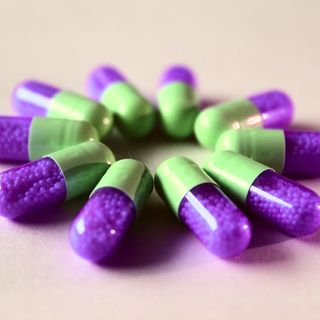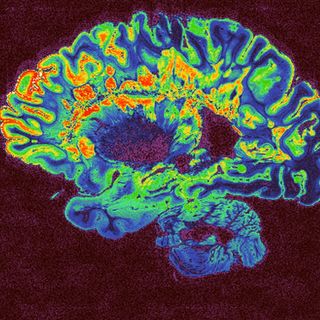
Grandchildren of Women Treated With DES During Pregnancy More Prone to ADHD
The harmful effects of a long-disused drug may stretch across three generations.

In 1938, in a laboratory in the US, diethylstilbestrol was manufactured for the first time. In the same year, the drug that would become known as DES was first prescribed to a pregnant woman. The “synthetic estrogen” was believed to prevent miscarriage and other pregnancy complications, like preterm labor.
Over the next 20 years, evidence would mount that DES was completely ineffective at preventing these complications. Twenty years after that, scientists would conclude that DES was not only useless in its treatment, it was actually harmful as well. It was banned as a treatment in 1971 after it became clear the drug precipitated clear cell adenocarcinoma, a rare form of vaginal cancer, in the daughters exposed in utero to the DES used to treat their pregnant mothers. Over the next few decades, as the health of these grown daughters was tracked, scientists learned the extent of DES damage; aside from being more prone to vaginal cancer, abnormalities in uterine structure were more common among this group of women, as well as pregnancy complications and infertility. (Sons of women treated with DES have not been affected to the same extent; there is some evidence they are more prone to non-cancerous testicular cysts, but face no heightened risk of cancer, infertility or genital abnormalities.)
Now, with the grandchildren of women treated with DES reaching adulthood, research is suggesting the drug’s fallout spans three generations. A new study by researchers at Columbia University’s Mailman School of Public Health and Harvard T.H. Chan School of Public Health has found a heightened prevalence of attention deficit hyperactivity disorder (ADHD) among the male and female grandchildren of pregnant women treated with DES.
Specifically, the grandchildren of women who took DES during pregnancy were 36% more likely to be diagnosed with ADHD than the general population — that chance jumps to 63% more likely, if their grandmothers took DES specifically in their first trimester of pregnancy.
“An exposure during pregnancy has the potential to impact multiple generations if the fetus is female, because the oocytes (aka egg cells) that will develop into the grandchildren of the pregnant woman grow while their mother is in utero,” the study’s lead author Marianthi-Anna Kioumourtzoglou, of the Mailman School of Public Health at Columbia University in New York City, told Reuters. “Use of DES during pregnancy or other endocrine disrupting chemicals could thus directly impact the third generation, leading to neurodevelopmental disorders, such as ADHD.”
Other studies have linked grandmothers’ DES treatment during pregnancy to delayed menstruation in women, and an increased risk of hypospadias in men, though the body of research on third-generation effects is nascent. Unlike their mothers, grandchildren seem not to face an increased risk of cancer or infertility.
While the research, treatment and harmful legacy of DES played out primarily in the West, the drug was used in India at the same time, says Mohan Rao, PhD, a professor at the Centre of Social Medicine and Community Health in Jawaharlal Nehru University’s School of Social Sciences. However, “I cannot speculate about how many women used it,” he says. “It couldn’t have been very high, given the limited medical facilities at that time. But it was certainly used on some elite women.”
Estimating the drug’s ripple effects across generations is impossible, adds Dr. Jaideep Malhotra, president of The Federation of Obstetric and Gynecological Societies of India.
“How do we know that the mother [or grandmother] has been treated?” she says. “There’s no documentation.”
Rao says the drug was banned in India when its harmful fallout came to light. But Medindia.net, which describes itself as “a leading online provider of health information, applications and services for consumers, doctors, healthcare professionals globally” and “#1 in India / South Asia in terms of traffic in the health category” currently lists DES as a medication for treating miscarriage. On diethelstilbestrol’s unique page, the drug is described as for use to prevent miscarriage and premature birth; confusingly, farther down the page, it’s noted the drug should not be taken during pregnancy. Under the sections “warnings and precautions” and “side effects” there is no mention of the dangerous effects on the children and grandchildren of anyone treated with DES during pregnancy. Medindia.net did not reply to a request for comment.
Malhotra says this is not accurate information, but adds she doubts current doctors are referring to the site for guidance.
“I’m not aware of [DES] being used at all nowadays,” she says. “I’ve not used it at all in my 35 years of practice.”
Liesl Goecker is The Swaddle's managing editor.
Related


Study Finds Vitamins, Popular Supplements Have Few Major Health Benefits
